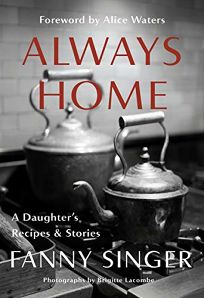Always Home by Fanny Singer
A fellow foodie friend loaned me his signed copy of this book — calling it the perfect escapist read during the pandemic. Given the title, I had to laugh and agree.
I just finished Always Home, having dipped in and out of it for many months now.
But first a little background; Fanny Singer is the daughter of Alice Waters, one of our most beloved chefs and founder of the famous Chez Panisse restaurant.
Alice was an early advocate of sourcing only the best local ingredients and is also known for her edible schoolyard program in Berkeley. And, although I am now weary of Alice and her endless publicity, I was fascinated to read this lovely memoir by her daughter, Fanny, who grew up in the glow of this revered chef.
Husband and I have been fortunate to have dined at Chez Panisse (and the more casual upstairs Fanny Cafe) and Always Home brings Fanny, her family, and behind the scenes of the restaurant to life. Turns out, Fanny was partially raised in the restaurant kitchens, surrounded by attentive chefs and prep cooks. Hers was a life full of love and really, really yummy food. Even Fanny’s lunchboxes were meticulously curated by her culinary-obsessed mother:
My lunches were not broken into courses as much as they were divided into multiple parts. There was a largish container that held a salad, a medium container for garlic bread (levain toast rubbed with olive oil and garlic), another for a season fruit compote or macédoine, a very small jar with a vinaigrette because, of course, we were both aware of the perils of prematurely dressing the salad.
Of course, I was intrigued by the recipes throughout the book and made notes to copy such delights as authentic French Citron pressé, various simple salad dressings, real Aioli, and Franny’s roast chicken which requires such high oven heat, that it comes with a warning to disable your smoke detectors.
I found Alice Waters’s quirks weirdly fascinating–her tendency to drink from bowls rather than mugs and to “jettison her silverware and delve in with her fingers,” expressing “a primal impulse to be closer to the thing she was eating, to be more sensuously acquainted.” Alice is dogmatic about sourcing only organic, locally-sourced ingredients and it’s revealed as what it actually is – an life-long obsession — which is termed “Chez shopping”.
But mostly I was drawn into the beauty of this life — how even the simplest meal could be made special, the focus on the fresh ingredients, and even the endless curation of flower arrangements everywhere:
Flowers were for my mom not just a confection to be enjoyed at the restaurant, but a part of what made any room complete. Billowing leafy branches and a few stems of some decidedly un-showy flower seem to be permanently installed in a large green urn in the far corner of the kitchen.
Fanny’s childhood trips to France are some of the best parts of Always Home — how their French friends sought beat up Brocantes (antiques) to restore, the overgrown but abundant garden, and evening meals outside under heavily scented rose bushes.
At the same time, this was (and is) a privileged life of wealth — surrounded by renowned cooks, celebrated artists, the access to abundant food resources, and the Berkeley bohemian culture. There is no shortage of name dropping, and a wee bit of trying-too-hard-overwriting. But, in the end, Fanny’s love and admiration for her mother emanates from every page:
There is a quality of ‘homecoming’ that transcend location, and not just because I reach deep into my repertoire of my mother’s recipes to animate her table through mine, but also she is somehow present even when she is not.
Always Home is charming, funny, full of love and really, really (did I say really?) good food. And, hey, any book that helps make a home special for those we love, and perhaps even ourselves, is beyond value these days.
But let’s turn to one of my favorite foodie writers Ruth Reichl — here is her review of Always Home
You will probably pick up this book because you’re curious about how it feels to grow up with Alice Waters as your mother. But you will inevitably be captivated by Fanny Singer’s sensuous voice and sensible soul. The writing’s lovely, but more than that, Fanny has struck a kind of brutal honesty that is extremely rare and completely beautiful. Her writing makes you want to taste every flavor she describes, and soon you’ll be dashing into the kitchen to make watercress soup, wild fennel cakes, and breakfast pudding. But the really important thing is that I’m pretty sure everyone who reads it will come away with the same feeling that I have: Why don’t I live my life like this? How can I do better? I love this book.”
A side note, this is quite an expensive book, however it feels nicely substantial in one’s hands, it’s printed on heavy paper, and contains many beautifully produced photographs. And the best — it’s bound so it will stay open for the recipes. Such a pleasure to have a book printed with that sort of craft and thought.






